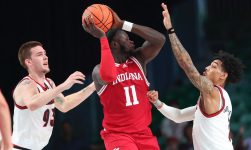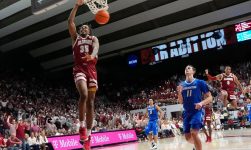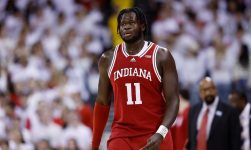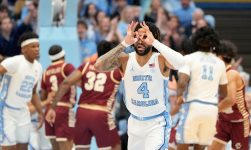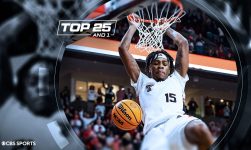CHICAGO — Summer basketball recruiting is an ethos built on, among many other things: being a walking/talking logo; showering with your wristband(s) on; inevitable wasted time; unavoidable wasted money; paying hundreds of dollars just to look at a roster; bad eating habits; worse sleep cycles; a continuously sore ass; and most treasured of all, story-swapping with coaching brethren all morning, all afternoon and all night long.
Along the way, maybe you find a player or two who changes the course of your career. Even better: Maybe you get to do the same for them.
The final run of the summer live period has arrived. This Wednesday-to-Sunday sprint prompts thousands of coaches across the United States to scramble and see as many players as possible. There’s a tangible urgency in the July air of every gym you walk into, be it with the coaches waiting on that one big commitment or the overeager players looking to impress and improve their scholarship circumstances. Some of the basketball is terrible.
Every coach charts a new path each summer. This year they are flocking to games in Los Angeles, Milwaukee, Atlanta, South Carolina and here in southwest Chicago, where new Florida coach Todd Golden and two of his staffers have decided to start. The 37-year-old Golden is a buzzy name in coaching, especially now that he’s in charge of a proud program. The former San Francisco Don developed a whiz-kid reputation in the past few years. His hiring at Florida surprised a lot of people in college basketball. Now, he has plenty of people wondering how he’ll fare going up against the big boys in the SEC.
How does a young coach adjust to this kind of job upgrade — and do so when recruiting and handling transfers has never been more tenuous? When you’re tasked with presiding over a big-time team and you’ve never done it, which path of the many treacherous ones that await do you to take?
Golden allowed CBS Sports to embed with him and his staff for the final five-day stretch of the July live period, the most important spell on the spring-into-summer recruiting calendar. Here’s what it’s like to run one of the biggest and best programs in the country — just three months into the job.
Wintrust Sports Complex hosted Under Armour’s tournament finals in Chicago.
Matt Norlander, CBS Sports
Day 1: Chicago
The unpredictable nature of this assignment is illustrated before it begins. The intention was not to start in Chicago, but that changed earlier in the week. It’s an example of how dubious travel plans can be and how quickly things can pivot while on the recruiting trail. The original idea was to meet Golden and his staff in Gainesville, Florida, on July 20 and fly on the team plane to Augusta, Georgia, for the Nike EYBL Peach Jam. Instead, the Under Armour Association finals became top priority on Golden’s itinerary. This travel improv is hardly a hurdle at a place like Florida whereas it would’ve been an expensive hassle not worth enduring at a mid-major like San Francisco where private planes and brawny recruiting budgets don’t exist.
At this level, flexibility is paramount.
I’m unable to change my flight and get to Gainesville in time. Instead, I fly directly to Chicago. Golden left his house for the airport around 9 a.m. Florida has two private planes; Golden and staff are taking the smaller bird because the bigger one was needed for the football program’s SEC Media Days trip. (Never forget who runs the show.) After a pit stop in Kentucky for a refuel on the way up, Florida’s plane touches down by 12:30 p.m. Golden has two other coaches on his staff in tow: Kevin Hovde and Jonathan Safir. They scoot out of the private airport, hustle to scarf down some Giordano’s deep-dish pizza nearby and get in the gym at 2:07 p.m. for the 2:15 p.m. tip.
The Under Armour Association finals features approximately 850 players between 14-17 years old. The tournament has 86 teams across all levels, and over the course of four days, roughly 300 Division I coaches will hoof in and out of Wintrust Sports Complex, a decade-in-the-making $30 million, 100,000-square-foot facility. It conveniently sits in a sprawling industrial park 2.2 miles from Midway Airport. There are eight courts, an ideal setting for a big-time basketball event. Under Armour’s tournament is the first major recruiting event in this building, which opened in October 2021.
Florida’s here primarily for one player. Thomas Haugh — a 6-foot-9, 205-pound power wing — is the Gators’ only high school commitment. He’s ranked No. 41 by 247Sports in the Class of 2023. Haugh plays for We R1, a team out of greater Philadelphia. Within 5 minutes, he makes a couple of big-time plays. The joy/relief in Golden’s face is obvious. It’s only the third time he’s seen Haugh play in person.
Editor’s note: NCAA rules prohibit coaches from speaking on the record about prospects until they sign with their programs. As such, all quotes from Florida coaches in this story will not identify players UF is recruiting. For players who are identified, coaches will not be quoted about those players.
Haugh looks like a top-100 caliber, certainly four-star material. Current player rankings don’t reflect that, but they will soon.
Two years ago, Haugh (pronounced “Hawk”) projected as a Patriot League-level recruit. Then he developed into a CAA/SoCon-level guy before Atlantic 10 schools came calling, which is where Hovde enters the picture. He recruited Haugh elsewhere as recently as four months ago when Hovde was an assistant in the A-10 at Richmond.
Three months ago, as Haugh began receiving scholarship offers from power-conference programs, he was on his way to an SEC-level trajectory. He became Florida’s first big target in the 2023 class. Fortunately for Golden and his staff, Haugh and his family are huge UF fans despite having no connection to the school. Haugh had Tim Tebow posters on his wall growing up. It was kismet. He committed June 29.
Now, Florida is three deep to support him in the first game of his final days of playing grassroots basketball. More than a dozen coaches from nationally relevant programs are on hand to watch, as most players here are uncommitted. The thirst is palpable. It’s also a whistle-heavy affair.
“These refs blow,” Golden says to another coach nearby.
He’s in midseason form.
Haugh plays well, so well that Golden has to remind himself to stave off that familiar instinct ingrained from his time at San Francisco. He doesn’t need to worry about a recruit being too good and getting vultured by a bigger program. (Look around in July and chances are good you’ll witness a terrified mid-major coach in the wild, dying more and more on the inside whenever one of their prospects buries a contested 3-pointer.)
“It’s definitely empowering,” Golden says when asked about making the jump to Florida. “At San Francisco, we can do a great job evaluating talent and getting in on guys early, but where we were, if Cal Berkeley or Stanford or UCLA jump in on a kid, we’re not beating them. It is what it is. At times, it felt like we were wasting time evaluating and recruiting kids because what we ended up realizing is all the good guys we got at San Fran we got late. The ones that were good enough we couldn’t get in the live period.”
With it being the first day, there are other three- and four-star prospects to monitor. The staff stays into the early evening for more games. They watch Team Curry 17s (Steph Curry’s program) and then the Atlanta Express 16s. Does Florida need to be at either of these games? No. But attending them ties back to a lesson a lot of coaches learn early on: Try to always acknowledge people working in basketball. It’s a massive community that manages to be tightly knit. Respond to texts in a timely fashion. Make that return phone call when you don’t want to. Catch a team’s game even if you’re not going to offer any a scholarship. Do so as a courtesy to the coach who’s helped you in the past or could help you in the future. You can get burned otherwise — any little thing can be used against you in recruiting, even if you don’t know it’s happening — and there’s no telling when people you meet at one stage of your career might be of significant value to you three, five, even 10-plus years in the future.
Not abiding by these unwritten codes in recruiting will inevitably put you out of a job.
That in mind, Florida will do its diligence on a handful of players. Team Curry has guards worth evaluating, while Atlanta Express is a program with whom the staff will want and need to have relationships given its proximity to Gainesville. Atlanta Express has a couple of 2024 prospects attracting big-school attention, including five-star Bryson Tiller, who in six days will announce his commitment to Overtime Elite (while maintaining his college eligibility). Florida needs to recruit from a position of genuine interest now, just in case Tiller has second thoughts Overtime Elite down the road.
Even knowing the ground rules, there’s some learn-as-you go for Golden here, though he spent a year as an assistant for Bruce Pearl at Auburn. Critically, Gators assistants Carlin Hartman (previously at Oklahoma) and Korey McCray (stints at UCLA, LSU, Mississippi State) have a combined 15 years experience coaching and recruiting at this level. McCray’s wife just gave birth to a boy, so he’s off the road this week. (Safir has taken McCray’s place as a limited exception.) In the meantime, Hartman’s daughter graduated from the Army at Fort Bliss in El Paso, Texas, on Tuesday. Since he was halfway to California, Hartman flew to Los Angeles in the morning to monitor or evaluate (a key difference) players in the 2023, 2024 and 2025 classes.
From a personal recruiting standpoint, Golden had to start over when he got the gig. There is no crossover between being the head coach at San Francisco and being in charge of the Gators. The ties he had to get players to USF don’t apply as he’s now recruiting against Pearl, Nate Oats, Rick Barnes and Eric Musselman. No, Kentucky’s John Calipari doesn’t make that list. Golden won’t be disillusioned or overpromise regarding UF’s current standing in the national recruiting pecking order. With rare exception, he’s not going to recruit against the bluebloods.
“I’m not going to waste my time,” Golden says. “Unless a guy is in our backyard [in Florida], we’re probably not getting a top-15 player.”
Todd Golden, in blue UF polo shirt, watches prospects with his staff in Chicago.
Matt Norlander, CBS Sports
To hear Golden explain it, one key to success in 2022 and beyond will be not overvaluing high schoolers. The recruiting model from 2017 is antiquated, let alone the one used in the early 2010s or before. Golden looks at roster management like a general manager of a pro franchise.
“What’s the one thing — and the data bears this out — the most successful franchises have in common?” Golden asks. “It’s a simple answer: draft picks. The more opportunities teams have to amass talent, the better they become over time.”
More swings on players equates to more chances they’ll hit. For Florida, the swings are veteran transfers and top-50 prospects. Florida will be utilizing the portal as aggressively as any SEC program. Golden’s recruiting philosophy comes down to this: go after high school players with high-end potential, then fill in the roster with 20- and 21-year-olds who’ve proven their value at the college level.
“We won’t take a younger guy unless we think he is physically ready to play for us in his first year,” Golden said. “We need pros. We need bad-ass dudes.”
Golden doesn’t expect most of his freshmen to be able to play significant minutes their first year. The calculus has changed, and Florida can’t rely on high school recruiting as its primary source if it wants to get back to consistent top-three status in the SEC.
“Florida is a legitimate national brand,” Golden said. “Coach [Lon] Kruger got it to a Final Four, Coach [Billy] Donovan continued to elevate it, and now, regardless of who the coach is, Florida is a national brand. Auburn’s brand right now is because of Bruce. It wasn’t a brand in 2014 when we got there. It was the second-worst high-major job in the country. Florida’s such a strong brand, and it was validated on that first trip, flying around, all six of those transfers were productive D-I players who wanted to visit us.”
In April, Golden and Hovde took the team plane to visit six transfers, five of whom wound up playing elsewhere. That’s just the odds. In fact, the last player they saw on that 36-hour, six-state jaunt across the East Coast and Midwest was Belmont’s Will Richard. Now, he’s a Gator.
“Going into it, we thought Will was going to be the hardest to get,” Golden said. “But our pitch was, ‘This is an opportunity to get in on the ground floor with what we think is a top-10 program in the country. It’s a newer-edge, analytically driven program.’ We felt really good about the fact we could talk to these guys transparently. …
“We wanted to ensure we had a good team for ’22-23, and just the way I think about it, there’s a lot less value in evaluating guys that may help your program three years down the road when you can legitimately change the course of your program by hosting official visits and get to that result a lot quicker. Adding Will Richard to our program is more valuable than any evaluation we could have done on any prospect this spring.”
Because of this, Golden didn’t see one high school player in the spring. In fact, only Hartman and McCray spent a day recruiting high schoolers in person in April. Everything was about bringing in transfers. Florida added six of them, led by Richard, St. Bonaventure’s Kyle Lofton and LSU’s Alex Fudge.
“It was so blatant that [the NCAA is] going to have to change the spring evaluation [calendar],” Golden said.
Golden’s no-road approach in the spring was not news to anyone in the program. It was part of his pitch in his interview to get the job. He brought San Francisco to top-25 status in the NET and KenPom.com last season, an outrageous accomplishment for a program that ranked 126th in the KenPom era.
Richard, Fudge and Trey Bonham (whom Hovde called an “analytical monster at VMI”) all committed on their visits. They weren’t all coming from prestigious spots. Florida made their choices carefully while still spreading something of a wide net, and Golden did it all with the idea that recruiting the portal took significant priority over the summer eval period. Now, that period’s almost done.
Golden, Hovde and Safir trade a litany of texts on the staff chain about what they’re seeing. It seems there is zero regret about coming to Chicago first. They’ll be back to see Haugh on Thursday morning, the only game Golden plans to watch before jetting out.
Before that, it’s time for one recreational night out. A drink at Tavern on Rush precedes an anticipated get-together at Gibsons Italia, the stylish and lively three-story restaurant perched on the bend of the Chicago River in the heart of Chicago’s spectacular downtown cityscape. Twenty-something singles overtake the bustling bar area on the second floor where Golden and his guys meet up with a couple of Golden’s agents. From there, a lavish dinner one floor up in the dimly lit dining room overlooking the river awaits. Bottles of wine induce frivolous gossip and did-you-hear-how-that-happened tales about the industry. The ribbing, war stories and harmless allegations ensure dinner goes well into the night.
Schools with big budgets own private planes, which has huge advantages in recruiting.
Matt Norlander, CBS Sports
Day 2: Return to Gainesville
CHICAGO — Haugh’s We R1 team has a 9:15 a.m. tip at Court 1. Golden, Hovde and Safir stroll in with some time to spare, their mandatory Starbucks cups in hand. We R1 is playing Middlesex Magic, an organization out of Massachusetts that has one of the bigger risers of the summer, a senior-to-be named J.P. Estrella who’s gaining interest from the likes of Duke, Iowa and Syracuse.
Haugh’s team — led by another stock-riser, combo guard Elmarko Jackson — wins 54-51 in a damn good game. Coaches on hand are smitten with Estrella and Jackson. We R1 stays alive in the winner’s bracket and will play again in the afternoon. Golden won’t be there to see it. He and Hovde are heading back to campus. Safir will stay behind before swapping spots with Hartman, who will fly into Chicago. Safir will take Hartman’s spot in Los Angeles for evaluations. Golden wants to walk the walk when it comes to having the staff have equal input on player evaluations. Having Hartman and Safir flip is a testament to that commitment.
At 10:52 a.m., Golden and Hovde stop for muffins a few blocks from the venue, then it’s right to Signature Flight Support, the private airport hub at Midway. Ole Miss coach Kermit Davis just landed and gives a hurried hello on his way to Wintrust.
Here’s how streamlined it is for the privileged who fly private: Hovde leaves the rental car right in front of Signature’s small building. A few paces later, automatic sliding doors greet him upon entering, as do Florida’s two pilots, Scott and Joseph, both of whom are employed by the school. They’re eager to take the coaches’ bags (and mine, I politely decline). Within minutes — by 11:20 a.m. — the plane is wheels up.
This is luxury travel by definition but also mandatory business for recruiting at a serious SEC school. Depending on location, time of day and airport, having the advantage of flying private slices dozens of hours off waiting, boarding and the necessary hurdles of commercial travel. Head coaches get to more games, providing a precious advantage. It’s significant enough that schools are willing to pay big in the great recruiting races, be it in basketball or the high stakes of football.
Florida’s men’s basketball recruiting budget is $325,000 annually. It also gets $260,000 allotted for plane fuel each year. Depending how many miles are flown, each recruiting trip can run between $10,000 and $40,000. This is a fraction of the program’s annual operating budget, which is well north of $2 million.
SOMEWHERE OVER THE UNITED STATES — At takeoff, it’s undetermined if the plane will need to swoop down for a refuel. Golden and Hovde still have that new-job glow about them. Private air travel will do that to you.
Golden is his own boss. He could do whatever he wants today. He could have stayed in Chicago. He could fly to watch prospects at Peach Jam. If Adidas’ tournament in Los Angeles was a need, he could head West. He tells the pilots where to fly, and that’s where we go. Surprisingly, he’s decided to leave the trail for nearly 20 hours and go back to Gainesville.
Barely any other head coaches are mixing in a practice and a workout session with their teams amid the five-day live period, yet here’s Golden doing it during his first summer on the job. It’s the most important thing he’ll do this week. The reasoning: His current players mean more to him than the ones who aren’t Gators yet. He’ll show that to them by being back for practice, even though he was with them two days ago.
The flight takes 2:20, so Golden mixes in a 30-minute cat nap while Hovde gets to work on his laptop for that afternoon’s practice plan. Gator Air zips above the clouds at nearly 35,000 feet traveling 370 miles per hour bound for Gainesville.
GAINESVILLE, 2:42 p.m. — The plane touches down and parks next to UF’s private hangar. Golden and Hovde’s cars are waiting for them where tarmac meets hangar, their trunks open, ready for cargo. It feels like a scene out of a “Mission Impossible” movie. That sensation quickly dissolves as we make our way to the Chipotle near campus. Nobody notices Golden.
Practice is scheduled for shortly after 4 p.m. Before then, a debrief in the meeting room adjacent to Golden’s office. He meets with the staff — save for Hartman (in California) and Safir (Chicago) — and shares to-the-point evaluations on who he saw in Chicago and who Hartman saw in Los Angeles. At this stage, Florida’s staff has gotten eyes on about eight players in 24 hours. Golden is vacillating on one of them as he has doubts about the prospect’s ceiling.
“Plus, his team loses almost every game he’s in, which is something that bothers me,” he says.
McCray, well-connected with many people in the grassroots space throughout the southeast, provides a few updates and thoughts on players Florida is recruiting in addition to others Golden will see in the next two days. Efficient as ever, the meeting is done within 10 minutes. It’s time for practice.
Golden swaps notes with his staff right before practice on Thursday.
Matt Norlander / CBS Sports
Team Workout No. 4 of July gets going and immediately feels like an in-season practice. Huge hardwood cutouts with the logos of Florida’s five Final Four appearances loom high on the walls, a wowing cosmetic addition to the building that Florida popularized in the 2000s under Donovan and has since been emulated by many programs. The practice facility is roughly 20 years old. When it opened, Florida was one of the only basketball programs in the country with a building solely dedicated to being a practice facility. These days, its age is showing a bit. It seems due for a major upgrade in the Golden Era.
As for Donovan, Golden quickly contacted him after being hired in March.
“He was great on the phone and wanted to pick my brain on the program,” Donovan said. “He was in a whirlwind. He was trying to make contact with former players and get connected with so many people. I just told Todd, ‘I want to see you do great. It’s a great place, and if I can help you out in any way, please let me know.’ We wound up talking a couple of times right when he got hired.”
Donovan’s presence looms physically and spiritually over the program; how could it not? Back-to-back national titles, four Final Fours, six SEC regular-season titles, a 467-186 record in 19 seasons. A huge mural of Donovan is prominently displayed in the atrium of the facility. About a year into former coach Mike White’s tenure, around 2016, someone in Florida’s athletic department came to him and said they planned on taking it down, thinking it might be inappropriate to keep it so soon after he left for the NBA.
White wouldn’t hear of it. He was vexed why it was even under consideration. It remained untouched, serving as a daily reminder of Florida’s expectations. In March, White deftly left — practically in the cover of darkness — but opted not to go far. He’s now the coach at Georgia.
Inside the practice facility on this steamy Thursday afternoon, the atmosphere is bouncy and light … but competitive. Golden, who played at Saint Mary’s in the 2000s, is getting up shots with the players before practice really revs into gear.
“I could be out there right now like other coaches recruiting,” Golden says. “But I wanted to be back here with you guys, show you how much we care about making you better.”
The drills get going, and in one quarter-court exercise, Golden looks like an orchestra conductor, directing his coaches and players: “Arms up! Out! And down.” No down time. No wasted minutes. An efficient afternoon. He looks at home and comfortable in the role already.
To the average observer, an hour-long practice might seem not worth the trip back; it’s just the opposite for Golden. Practice wraps at 5:18 p.m., the players and coaches huddling around the huge Gators logo at center court. Big claps, hoots and hollers.
“We have the talent,” Golden tells the team. “The difference between being a bubble team and getting to an Elite Eight, Final Four is effort.”
It’s hard to be good. To Golden, days like this one get you there. Days like tomorrow will be, too. A Friday morning conditioning session looms. Everyone in the building before 7 a.m.
Join us Friday for Part II of this CBS Sports feature: Five days embedded with Florida.

